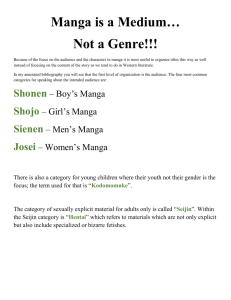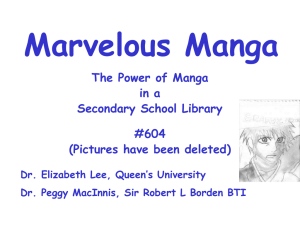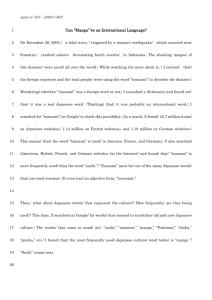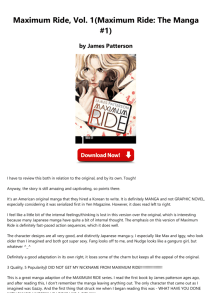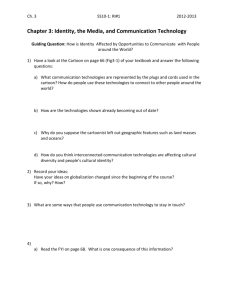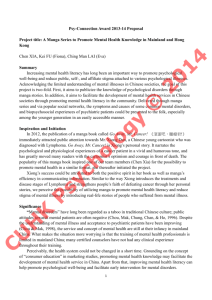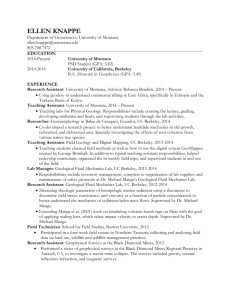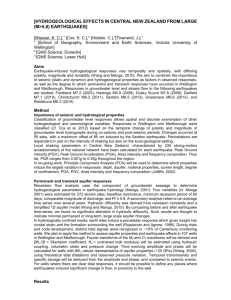Senior Project Archive Template
advertisement
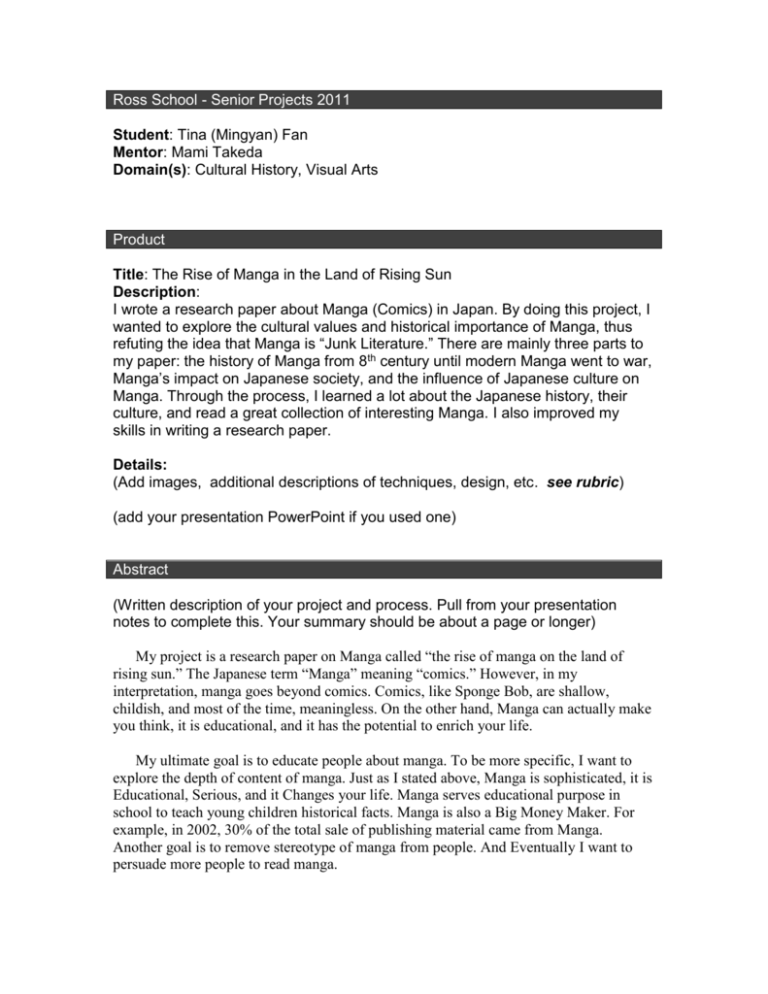
Ross School - Senior Projects 2011 Student: Tina (Mingyan) Fan Mentor: Mami Takeda Domain(s): Cultural History, Visual Arts Product Title: The Rise of Manga in the Land of Rising Sun Description: I wrote a research paper about Manga (Comics) in Japan. By doing this project, I wanted to explore the cultural values and historical importance of Manga, thus refuting the idea that Manga is “Junk Literature.” There are mainly three parts to my paper: the history of Manga from 8th century until modern Manga went to war, Manga’s impact on Japanese society, and the influence of Japanese culture on Manga. Through the process, I learned a lot about the Japanese history, their culture, and read a great collection of interesting Manga. I also improved my skills in writing a research paper. Details: (Add images, additional descriptions of techniques, design, etc. see rubric) (add your presentation PowerPoint if you used one) Abstract (Written description of your project and process. Pull from your presentation notes to complete this. Your summary should be about a page or longer) My project is a research paper on Manga called “the rise of manga on the land of rising sun.” The Japanese term “Manga” meaning “comics.” However, in my interpretation, manga goes beyond comics. Comics, like Sponge Bob, are shallow, childish, and most of the time, meaningless. On the other hand, Manga can actually make you think, it is educational, and it has the potential to enrich your life. My ultimate goal is to educate people about manga. To be more specific, I want to explore the depth of content of manga. Just as I stated above, Manga is sophisticated, it is Educational, Serious, and it Changes your life. Manga serves educational purpose in school to teach young children historical facts. Manga is also a Big Money Maker. For example, in 2002, 30% of the total sale of publishing material came from Manga. Another goal is to remove stereotype of manga from people. And Eventually I want to persuade more people to read manga. My original idea for senior project is to create a manga book. However, after several drawing class, I found it more interesting to research about Manga than to draw a manga. Thus, I decided to do something more academic for my senior project, which is to write a paper. I began my paper with the history of Manga because it is important to learn its origin if you ever want to know something thoroughly. After I finished the part of history, I finally decided my thesis statement: the mutual influence of Japanese culture, society, and manga. As soon as I decided my thesis statement, I started thinking about which manga would support this statement. This was not an easy task because there were so many great manga books. So after talking to my mentor, we decided to do it by categories: I will talk about the science fiction manga, sports manga, and yaoi. From those, I can just search for whichever one is the best-known. After choosing manga, the fun part came. I have to read all those manga books. Although I said before I’ve read a lot, but most of those I chose were either old, or sophisticated which I never considered reading before. Although reading manga was fun, to build the bridge between manga and Japanese culture was a painful task. I could not find any useful information directly online. Thus, Mami suggested I should check the time this manga was drawn and search for the history context of that time separately. I did that, and it works, but it means I have to read the history of Japan from WWII to nowadays, which is an extremely time-consuming task. To support my thesis statement, I divided the rest of my paper into two parts. The first part is Japan’s influence on Manga. I choose science fiction manga and Neon Genesis Evangelion. The other part is Manga’s impact of Japan. In this part, I talked about Yaoi Manga, which is homosexual Manga, and Sports Manga. After I finished my paper, I have to edit it over and over again with Mami. We emailed back and forth, and we revised it 4 times before the final vision. In doing this project, my research skill is highly improved. I learned a great collection of academic and scholarly websites other than Google and Wikipedia. I also learned that not everything is common sense as I assumed, so I have to have a resource for every single statement in my paper. I learned how to differentiate between good and garbage resources, which saves me a lot of time when researching. I learned how to organize a paper. Rather than wasting time trying to put everything into one single piece, I learned to separate a long paper into appropriate sections. The last skill I learned is citation. Now I know how to do citation, how to do in-text citation, and how to cite international resources. Through this project, I learned a lot about Japan, which stimulate my further interest in this country. In the future, I will go to Japan during the coming summer break for about 1 month to learn their language, and traveling around. In long –term, I really hope to become an editor in a company publishing manga. Works Cited or Works Consulted (in MLA format unless another formatting was used, i.e. APA, scientific, etc.) “世界首款性爱机器人问世 皮肤如真人 [The first female androids]." Sina.com.cn 14 Jan. 2010. Web. 04 Jan. 2011. <http://sc.sina.com.cn/health/ysbj/2010-0114/09068868_2.html>. HNCE. "世界上第一款美女性爱机器人推出 [The first female androids]." Hnce.com 08 Feb. 2010. Web. 26 Nov. 2010. <http://people.hnce.com.cn/c/2010-0208/60649.shtml>. CCTV International. "影响日本两代人的漫画 [manga which influence the last two generation of Japan]." Cctv. com 19 Aug. 2004 Web. 24 Nov. 2010. <http://www.cctv.com/art/20040819/100520.shtml>. Eng, Lawrence. "The current status of "otaku" and Japan's latest youth crisis." Cjas. org 01 April 2009. Web. 27 December 2010 <http://www.cjas.org/~leng/hikiko.htm>. Fusanosuke, Natsume. "Japanese manga: Its Expression and Popularity." 2003. Web. 26 Nov. 2010. <http://www.accu.or.jp/appreb/09/pdf34-1/34-1P003005.pdf>. "Most technologically advanced country (military, companies, engineering)." Citydata.com Web. 27 December 2010 <http://www.citydata.com/forum/ world/273553-most-technologically-advanced-country.html>. Ruh, Brian. "The Function of Woman-Authored manga in Japanese Society." Animeresearch.com 2001 May. 2010 Web. 15-November <http://www.animeresearch.com/Articles/WomenInManga/>. The World Factbook. Web. 27 December 2010 <https://www.cia.gov/library/publications/the-worldfactbook/geos /ja.html>. Dictionary.com. 2010. Web. 07 December 2010. <http://dictionary.reference.com/browse/comic >. "Genesis Evangelion." Quackpot. Web. 04 January 2011 <http://quackpot.com/gallery/evangelion/evangelion_rei_1280x1024_13>. "Ikebukuro Sightseeing." Blogspot. 04 August 2008. Web. 07 December 2010. <http://threestepsoverjapan.blogspot.com/2008/08/ikebukurosightseeing.html>. Merriam Webster dictionary. Web. 20 December 2010<http://www.merriamwebster.com/dictionary/comic>. SCHREIBER, MARK. "From ancient to modern." Japantimes. 23 March 2003. Web. 20 December 2010. <http://search.japantimes.co.jp/cgi-bin/ fl20030323a4.html>. “A history of manga." Essortment. com. 2002. Web. 06 Nov. 2010 <http://www.essortment.com/all/historymanga_rqyz.htm>. Aoki, Deb. "Early Origins of Japanese Comics." About.com Web. 05 Nov. 2010. <http://manga.about.com/od/historyofmanga/a/mangahistory1.htm>. Aoki. "History of manga - manga Goes to War." About. com Web. 06 Nov. 2010. <http://manga.about.com/od/historyofmanga/a/mangahistory2.htm>. "BINNIE -- "Shunga of Utamaro" ("Tattoo Girl")." Ukiyoe-Gallery.com Web. 04 Jan. 2011 <http://www.ukiyoe-gallery.com/detail-pbshunga.htm>. "Blind Monks Examining an Elephant." Snmjournals. org. Web. 04 Jan. 2011 <http://jnm.snmjournals.org/cgi/content-nw/full/49/Suppl_2/24S/FIG12>. "History of manga." manga Wiki. Web. 04 Jan. 2011 <http://manga.wikia.com/wiki/History_of_manga>. Lv, Jiang. "卡通产品设计 [Cartoon Product Design]." China: South East University Publisher, 2005. Print. "News: Yomiuri Newspaper Discusses History's First manga." Animenewsnetwork. 03 Jan. 2008. Web. 04 Jan. 2011 <http://www.animenewsnetwork.com/ news/2008-01-03/yomiuri-first-manga>. "Yomiuri Newspaper Discusses History's First manga." Animenewsnetwork. 03 Jan. 2008 Web. 05 Nov. 2010 <http://www.animenewsnetwork.com/news /2008-01-03/yomiuri-first-manga>. Schreiber, Mark. "From ancient to modern." Japantimes. 23 Mar. 2003. Web. 05 Nov. 2010. <http://search.japantimes.co.jp/cgi-bin/fl20030323a4.html>. Sr.Nefasto. ""ukiyo-e" por Shumboko Ono." Flickr. 02 May 2005. Web. 04 Jan. 2011 <http://www.flickr.com/photos/79707350@N00/11980508/>. "THE JAPAN PUNCH." Yushodo. Web. 04 Jan. 2011 <http://www.yushodo.co.jp/press/punch/index.html>. Thorn, Matt. "A History of manga." Matt-Thorn. com 2007. Web. 07 Nov. 2010. <http://www.matt-thorn.com/mangagaku/history.html>. "Ukiyo-e Series #2: Ghostly Worlds." Pingmag. 16 Aug. 2007. Web. 04 Jan. 2011 <http://pingmag.jp/2007/08/16/ukiyoe-ghost/>. Zagzoug, Marwah. "The History of Anime & manga." nvcc. edu. Apr. 2001. Web. 06 Nov. 2010. <http://novaonline.nvcc.edu/eli/evans/his135/Events/ Anime62/Anime62.html>. aďo. "History of Yaoi." Yaoi.sk & shounen ai 21 Jan. 2006 Web. 23 Nov. 2010. <http://www.yaoi.sk/index.pl?article_h=clanok.4&class=clanok.4&language =en&session=720ee215fd9ffd87c9f6ddf51c7fcce6&rnd=5783>. Brent Wilson, Masami Toku. ""Boys' Love," Yaoi, and Art Education: Issues of Power and Pedagogy." Csuchico.edu Web. 20 Nov. 2010. <http://www.csuchico.edu /~mtoku/vc/Articles/toku/Wil_Toku_BoysLove.html>. Carnehil. "Claim Your Dream Claim HERE! [OPEN]." Myanimelist.net Web. 04 Jan. 2011 <http://myanimelist.net/forum/?topicid=198206&show=20>. drupagliassotti. "Male/Male Romance Novels in the News." drupagliassotti.com 04 Jan. 2010. Web. 23 Nov. 2010. <http://drupagliassotti.com/2010/01/04 /malemale-romance-novels-in-the-news/>. Faiola, Anthony. "Men in Land of Samurai Find Their Feminine Side." Washingtonpost.com 22 Sep. 2005 Web. 23 Nov. 2010 <http://www.washingtonpost.com/wp-dyn/content/article/2005/09/21 /AR2005092102434.html>. Faiola, Tony. "In Japan, men find feminine side - Polls show it's what women want." Freerepublic.com 23 Sep. 2005 Web. 23 Nov. 2010 <http://www.freerepublic.com/focus/f-chat/1490682/posts>. Hays, Jeffrey. "HOMOSEXUALITY IN JAPAN." Mar. 2010 Web. 23 Nov. 2010 <http:// factsanddetails.com/japan.php?itemid=670&catid=19&subcatid=127>. kitty_hanoi. "Miyavi 2009." Last.fm 06 Mar. 2009 Web. 04 Jan. 2011 <http://cn.last.fm/music/%E9%9B%85-miyavi-/+images/25014043>. Shoushi, Sam. "Japan and Sexual Minorities." Asia-Pacific human rights information center Web. 23 Nov. 2010 <http://www.hurights.or.jp/asia-pacific/052/ 03.html>. "Takuya Kimura Wallpaper #2." Entertainmentwallpaper.com 06 Jun. 2009 Web. 04 Jan. 2011 <http://www.entertainmentwallpaper.com/download/ 30017684/>. "Urban Dictionary - Uke." Urbandictionary.com Web. 23 Nov. 2010 <http://www.urbandictionary.com/define.php?term=uke>. "Yaoi." Animenewsnetwork.com Web. 18 December 2010 <http://www.animenewsnetwork.com/encyclopedia/lexicon.php?id=23>. Ant Network. "Japan Basketball Association Awarding Slam Dunk creator Takehiko Inoue With A Special Commendation." Ant-network.com 10 Jun. 2010 Web. 26 Nov. 2010 <http://www.ant-network.com/japan-basketball-associationawarding-slam-dunk-creator-takehiko-inoue-with-a-specialcommendation/>. "Captain Tsubasa." Retrojunk.com Web. 25 Nov. 2010 <http://www.retrojunk.com/details_tvshows/1584-captain-tsubasa/>. "Captain Tsubasa and the beginning of a football romance." Sportingo.com 14 Ocb. 2008 Web. 22 Dec. 2010 <http://www.sportingo.com/football/ a10495_captain-tsubasa-beginning-football-romance>. Kanazawa, Mari. "The influence of manga." Blogs.com 23 Feb. 2007 Web. 27 Nov. 2010 <http://smt.blogs.com/mari_diary/2007/02/the_influence_o.html>. Oshima, Takeo. "メジャースポーツへの道 [The road to major sports/ relationship between sports and media]." Web. 20 Nov. 2010 <http://www.rikkyo.ne.jp/web/ronkore/03G3.htm>. "Slam Dunk." Blogspot.com 28 Aug. 2008 Web. 05 Jan. 2011 <http://hopes-prayerswishes.blogspot.com/2008/08/slam-dunk.html>. Slam dunk scholarship office. "スラムダンク奨学金 [Slam dunk scholarship]." Web. 20 Nov. 2010 <http://slamdunk-sc.shueisha.co.jp/index.html>. Sports 163. "Sports Manga have profound influence." 163.com 26 Jun. 2010 Web. 27 Nov. 2010 <http://v.sports.163.com/video/2010/6/J/G/V696QHVJG.html>. The Japan Forum. "日本の文化と人びと [Japanese culture and people]." Web. 26 Nov. 2010 <http://www.tjf.or.jp/clicknippon/ja/jcn/t09jcn_j.html>. Amy Zalman, Ph.D. "1995: Aum Shinrikyo Tokyo Subway Gas Attack." about.com Web. 17 Nov. 2010. <http://terrorism.about.com/od/originshistory/a /AumShinrikyo.htm>. "Japanese Industrialization and Economic Growth." EH. net 02 Feb. 2010. Web. 17 Nov. 2010. <http://eh.net/encyclopedia/article/mosk.japan.final>. Cassegard, Carl. "From Withdrawal to Resistance. The Rhetoric of Exit in Yoshimoto Takaaki and Karatani Kojin." Japanfocus. org Web. 04 Jan. 2011 <http://www.japanfocus.org/-Carl-Cassegard/2684>. Clarke, Josh. "How A. T. Fields from Neon Genesis Evangelion can relate to Real Life." Evamonkey.com 22 Mar. 2004 Web. 16 Nov. 2010. <http://www.evamonkey.com/writings_clarke01.php>. Gryphomon. "Absolute Terror Field." Deviantart.com Web. 04 Jan. 2011 <http://gryphomon.deviantart.com/art/Absolute-Terror-Field165993045?q=gallery:gryphomon/2914230&qo=9>. Hays, Jeffrey. "JAPAN’S BUBBLE ECONOMY AND COLLAPSE." Facts and details. Mar. 2010. Web. 17 Nov. 2010. <http://factsanddetails.com/ japan.php?itemid=522&catid=16&subcatid=110>. "Historical context of Evangelion." zhile265.com 27 July 2010. Web. 17 Nov. 2010. <http://www.zhile365.com/tieba.php?do=tie&tie_id=280>. Japan Cultural Profile. "Post-war economic recovery." Culturalprofiles.net 02 Oct. 2006. Web. 22 Dec. 2010. <http://www.culturalprofiles.net/japan/Directories/Japan_Cultural_Profile/ -13226.html>. Miclaus, Claudia. "Porcupines and dilemmas." Buzzle.com Web. 17 Nov. 2010. <http://www.buzzle.com/articles/porcupines-and-dilemmas.html>. "Neon Genesis Evangelion – Death & Rebirth Movie." Wordpress.com Web. 04 Jan. 2011. <http://watchfreeanime.wordpress.com/2008/01/03/neon-genesisevangelion-death-rebirth-movie/>. "Retreating Youth Become Japan's 'Lost Generation'." Npr. org 24 Nov. 2006 Web. 24 Nov. 2010. <http://www.npr.org/templates/story/ story.php?storyId=6535284>. Roy, Sandip. "Japan's Shut-In 'Hikikomori' Protest Conformity." Newamericamedia.org 19 Feb. 2007 Web. 16 Nov. 2010. <http://news.newamericamedia.org/news/view_article.html?article_id=f65d efb305c72375f7dfb08ee2d74ed2>. Scaruffi, Piero. "A time-line of Japan." Scaruffi.com 1999. Web. 12 Nov. 2010. <http://www.scaruffi.com/politics/japanese.html>. "The End of Evangelion." Web. 04 Jan. 2011. Imanhua.com <http://imanhua.com/comic/958/list_27687.html?p=56>. Woznicki, Krystian. "TOWARDS A CARTOGRAPHY OF JAPANESE ANIME." Nettime. org 19 Feb. 1998. Web. 16 Nov. 2010. <http://www.nettime.org/ListsArchives/nettime-l-9802/msg00101.html>. BANDAI. "Mobile Suit Gundam SEED Destiny." Japan: Bandai Entertainment, 2005. Print. "conceptships." Blogspot. com 29 May 2008. Web. 04 Jan. 2011 <http://conceptships.blogspot.com/2008/05/katsuhiro-otomo-onconceptships.html>. HNCE. "世界上第一款美女性爱机器人推出 [The first female androids]." Hnce.com.cn 08 Feb. 2010. Web. 16 Nov. 2010. <http://people.hnce.com.cn/c/2010-0208/60649.shtml>. Lv, Jiang. "卡通产品设计 [Cartoon Product Design]." China: South East Publisher, 2005. Print. Otomo, Katsuhiro. "Akira." Tokyo: Kodansha, 1990. Print. Schodt, Frederik L. "Dreamland Japan. Writings on Modern manga." All-art.org Web. 04 Jan. 2011 <http://www.all-art.org/art_20th_century/manga/m001.html>. Sina Entertainment. "大友克洋 机器人嘉年华 [katsuhiro otomo: androids Carnival]." Sina. com.cn 29 Sep. 2003. Web. 16 Nov. 2010. <http://ent.sina.com.cn/avworld/2003-09-29/1249208678.html>. "Suzaku - commanding the Lancelot Knightmare." Pureanimegallery.com Web. 04 Jan. 2011 <http://www.pureanimegallery.com/v/code-geass/suzakuururugi/suzaku-lancelot-knightmare.jpg.html>. Tanaka, Kenichi. “Japan - The Strange Country (English).” Youtube. Web. 16 Nov. 2010. <http://www.youtube.com/watch?v=rgsbIfI0uIg>. Tezuka, Osamu. "Metropolis." Japan: Ikuei Shuppan Kodansha, 1949. Print. "WORKS MADE BY clamp." Ghuset.se Web. 04 Jan. 2011 <http://www.ghuset.se/Sanna/otherseries.htm>. Outside Consultant Name: Therese Lichtenstein Occupation: Art History teacher at Ross School One main part of my research paper is the history of Manga. Ms. Lichtenstein is an expert on this – the history of Art. She knows a lot about the history of Japanese art, and some modern Manga characters. (Outside consultant name and occupation details/how they are related to your project)
